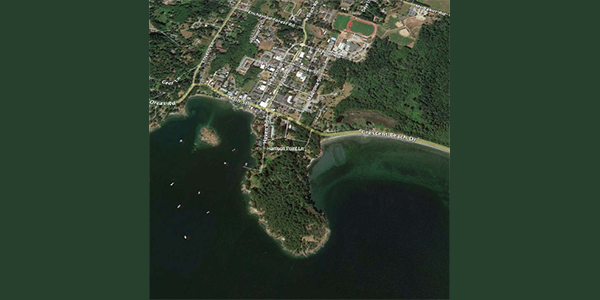Nonprofit acquires 2.14 acres for $3 million
||| FROM RICHARD ARLIN WALKER for SALISH CURRENT |||
A nonprofit led by a former Lummi Nation chairman has acquired 2.14 acres of ancestral land on Orcas Island in Eastsound. The land will ultimately be turned over to the Lummi Nation.
The land is next to Madrona Point, more than 24 acres that the Lummi Nation acquired in 1989. Madrona Point, the title to which is held in trust by the United States, is a sacred area. Madrona Point and the latest acquisition are part of the ancestral village of Ts’el-xwi-sen’, which comprised what is now Eastsound.
The nonprofit Se’Si’Le purchased the 2.14 acres from Rose Lee, Jeffrey Reinking and Glenhari Group LLC for $3 million, according to records available online on the San Juan County assessor’s website. The transaction closed on March 17.
W’tot lhem Jay Julius, the former Lummi chairman, is the founder and chairman of Se’Si’Le (pronounced “saw-see’-law,” which means “our grandmother” in Xw’lemi-chosen, the language of the Lummi people). The organization works to protect Indigenous areas, resources and sacred sites.
Se’Si’Le presented at the International Indigenous Salmon Seas Symposium in October 2022 at Woodland Park Zoo in Seattle, with participants including representatives of the Lummi and Yakama nations, the Organized Village of Kake and the United Tribes of Bristol Bay in Alaska, and the indigenous Udege and the Itelmen peoples of the Russian Far East.
A living cultural center is one vision for the site, though that will be up to the Lummi Nation, Julius said.
“What I would love to see is a place where Orcas Island folks can learn more about the history of Madrona Point, the Lummi people, the Swa’lax people. A lot of us have a deep history there,” he said. “My thought around it is education. That’s my hope. Madrona Point is off-limits because it’s a sacred place. [A living cultural center] could help educate folks and be utilized as that space that a lot of people desire and are craving.”
The Lummi Nation formerly allowed the public to walk Madrona Point’s trails, but closed it in 2007 because the site had been desecrated.
In an article he contributed to the Sierra Club’s April 2023 magazine, Julius described Orcas Island — Swa’lax in the Lummi language — as the place where the Lummi or Lhaq’temish people “lived for countless generations back to the ancestral before-time of Xales (‘the Transformer’) and where our Ancient Ones live on in sacred songs, oral histories and in the spirit of place.”
He told Salish Current, “Our people are of this place.”
**If you are reading theOrcasonian for free, thank your fellow islanders. If you would like to support theOrcasonian CLICK HERE to set your modestly-priced, voluntary subscription. Otherwise, no worries; we’re happy to share with you.**








To me this is good news. And I hope these lands can be used to establish some kind of common meeting ground between the Lummi Nation and current islanders, helping to promote a sense of mutual understanding and respect.
This is the best news I have read in such a long time.
It’s kind of sad that the previous property owners were able to extract $3 million from a well-intentioned tribal group for a property that the county had appraised for “only” $831,430 as of last year. It’s tax parcel number 271460074000 if anyone’s curious, 155 Harrison Point Lane 98245. The home is modest, the parcel is relatively small, and although the location is desirable, the sale price seems far above market value.
It’s a shame that there’s no native people’s living on the remnants of their own land… you’d think there’d at least be a caretaker’s residence, or an interpretive center.